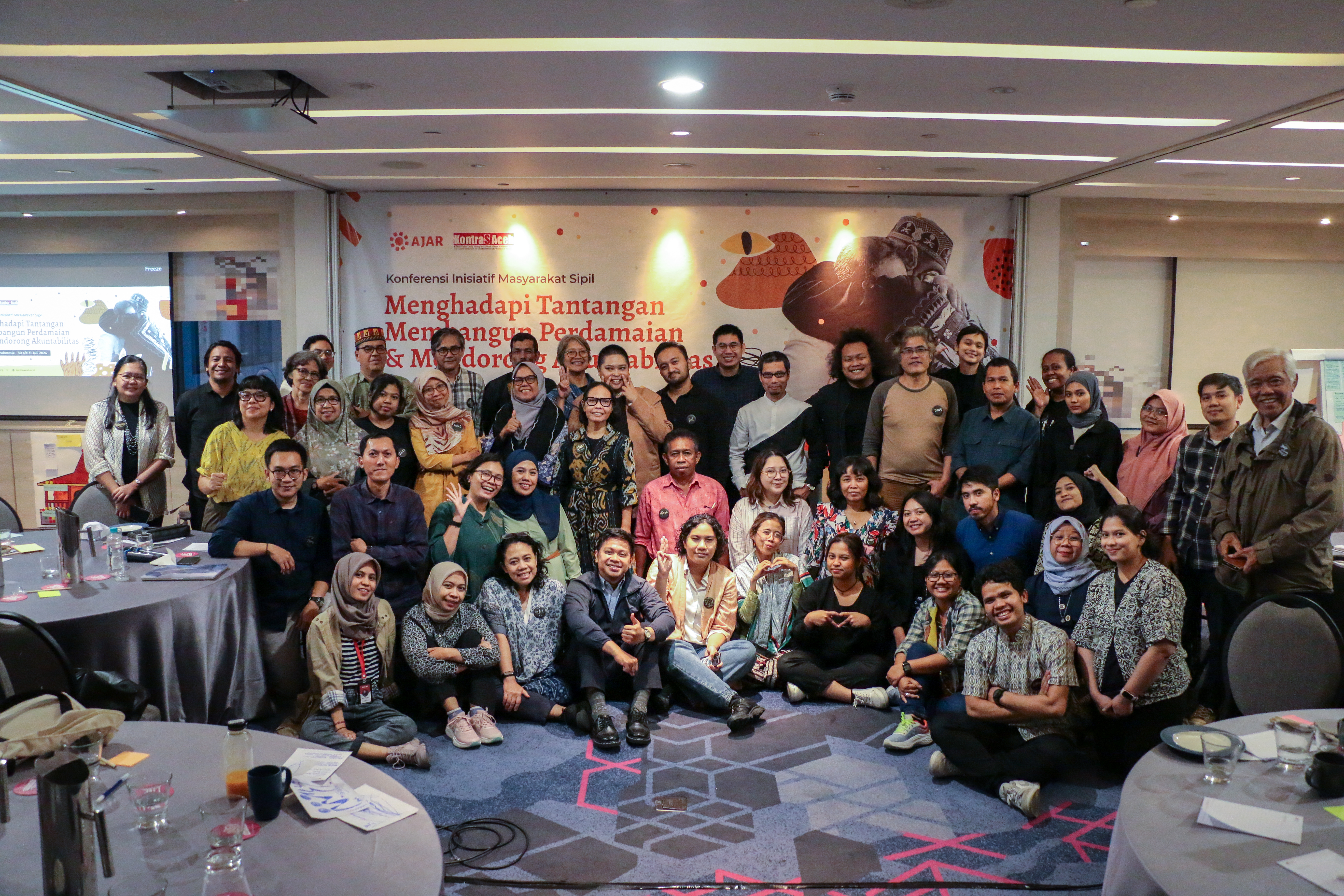After 26 years of the Reform Era, Indonesia’s democracy and culture of accountability have witnessed a troubling decline in civil rights and persistent impunity. Numerous serious human rights violations remain unacknowledged, and effective remedies to address these issues are lacking. Despite these obstacles, civil society efforts persist in establishing a culture focused on peace and responsibility. Several grassroots movements advocate for truth and justice due to ineffective government intervention. Civil society organisations are essential in shaping public conversations, providing different perspectives, and pushing for official government acknowledgement.
Asia Justice and Rights (AJAR) and KontraS Aceh have been actively supporting local communities, working with youth groups, and aiding transitional justice mechanisms, with a particular emphasis on the Aceh Truth and Reconciliation process. Starting in 2022, AJAR and KontraS Aceh have focused on enhancing civil society and victims’ organizations by examining the post-peace process and addressing the continued requirement for accountability in Aceh.

On July 30-31, 2024, AJAR and KontraS Aceh hosted a two-day national seminar in Jakarta. Participants could exchange reflections and insights on conflict transformation, peacebuilding, accountability, and preventing recurrence. Eighty participants came from more than 13 provinces, including delegates from Aceh and Papua. This all-encompassing platform enabled conversations on different projects, obstacles, and insights on civil society’s work in handling social conflicts, post-peace agreements, and widespread violations and discrimination against marginalised groups. Collectively, participants developed strategies to harness current political momentum to pursue accountability for mass human rights violations and to strengthen social movements for peace and reform in Indonesia.
Indria Fernida, the regional manager of Asia Justice and Rights, emphasised in her opening remarks that efforts to build peace often overlap with efforts to achieve accountability, yet they frequently fail to align. Indria suggested that to successfully advocate for the rights of victims, marginalised groups, and minorities, both initiatives need to work together to address future challenges.
One of the panels discussed peacebuilding lessons from Aceh. Fuadi Mardhatillah from KontraS Aceh described their work addressing the repercussions of conflict in Kampung Sedia Jadi, Bener Meriah regency. This required navigating distinct ethnic tensions in the Central Aceh region compared to those in coastal disputes. KontraS initiated reconciliation in 2020, bringing opposing parties together in 2022, serving as a successful peacebuilding model for villages of similar conditions.
From eastern Indonesia, Bai Tualeka from the Lappan Maluku Foundation highlighted civil society efforts to prevent conflict recurrence by showcasing women-led initiatives that combined interfaith and traditional values to de-escalate tensions. The local government responded positively to this movement, effectively averting conflicts stemming from religious issues.
Investment in eastern Indonesia has significantly increased immigration, potentially leading to conflicts, especially in Papua. The Secretariat of Justice for Peace and Integrity of Creation Franciscan Papua (SKPKC), a church-based NGO in Papua, has recommended church leaders counsel their followers against being provoked by actions that may result in tensions between locals and immigrants.
At the forum, young panellists discussed current initiatives to tackle social and cultural tensions, stressing ethnic and religious divisions. The conversations underscored the need for research and advocacy to expose discriminatory practices and emphasised youth’s key role in advancing diversity and inclusion in different communities. Civil society played a significant role in addressing extremism and promoting peace, with demands for broader legal changes and safeguards for at-risk populations. The forum highlighted the difficulties experienced by marginalised communities and emphasised the importance of inclusive and collaborative peacebuilding efforts involving various stakeholders.
During the event, two Indonesian independent state institutions, the National Commission on Violence Against Women (Komnas Perempuan) and the Witness and Victim Protection Agency (LPSK), stressed the importance of human rights victim support.
Responding to panelists’ grassroots experience, Komnas Perempuan maintained their encouragement of local-based remedy efforts. Similar to LPSK, their support of victims of mass human rights violations is often limited to those whose cases have reached the courts.
Despite continuous peacebuilding efforts to encourage accountability by various civil society organisations, existing policies frequently work against these initiatives. Recent legislation related to the National Police and the Indonesian Military has triggered worries about possible cyber-surveillance aimed at civil society and the increasing presence of military forces in civilian areas, increasing doubts about the government’s commitment to creating a peaceful and inclusive atmosphere.
These issues were further investigated at AJAR’s “House of Peace” workshop, where attendees examined the level of peace in their respective environments. Crucial topics included community safety, conflict dynamics, militarisation, and the participation of minority groups. Participants discussed gender equality and accountability, emphasising the obstacles marginalised communities face in accessing meaningful participation and protection under current policies.
This activity is part of the #PeacebuildingandTJ project to promote accountability for peace through community-led transitional justice focusing on institutional reform and non-recurrence. Held in collaboration with Asia Justice and Rights, the Commission of Disappeared and Victims of Violence Aceh (KontraS Aceh – Indonesia), Cross-Cultural Foundation (CrCF – Thailand), Solomon Islands Trauma Healing Association (SITHA – Solomon Islands), and Asosiasaun Chega! Ba Ita (ACbit – Timor-Leste), was made possible with the support of the European Union.